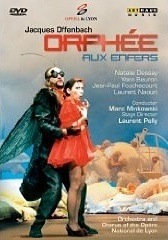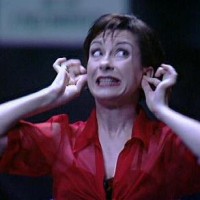Opera and comedy can be a very awkward match. Despite the number of comic operas in the standard rep, most opera fans don’t seek out a local production of, say, Die Entführung aus dem Serail because they need a giggle and 30 Rock is a repeat that night.
And so the 1997 Opéra National de Lyon production of Offenbach’s Orphée aux Enfers, now on DVD from Arthaus Musik is an extreme rarity: a comic opera that manages to be musically satisfying and extremely funny at the same time.
Offenbach’s work, a broad and bawdy satire of conventional morality (and, more specifically, Gluck’s Orfeo ed Euridice) is probably not on anyone’s list of favorite scores, but stage director Laurent Pelly’s fast-paced, zany production makes a compelling case for this Orphée as an irreverent celebration of basic physical love, rather than the more highbrow spiritual kind that romantic characters in opera are always liebestoding about.
A pair of newlyweds (Yann Beuron as Orphée and Natalie Dessay as Eurydice) are perfectly happy as long as they’re spending time apart, ideally in the arms of their respective extramarital lovers. When Eurydice’s beau, the vaguely menacing shepherd Aristée (Jean-Paul Fouchécort), is revealed to be Pluton, king of the underworld in disguise, she is carried off to the underworld – and her husband couldn’t be more pleased.
But Public Opinion (a delightfully straight-laced Martine Olméda), in a stylish but sensible earth-toned suit, demands that he do the right thing and pursue his wife to the underworld.
In the process, he enlists the help of a group of gods bored by spending their days napping in a pillow-covered Mount Olympus, and soon enough virtually everyone, divine and mortal alike, is dancing to the galop infernal (better known as the melody for the Can-Can) in Hell and having a wonderfully immoral time. Even Public Opinion manages to crack a smile during the curtain call reprise.
Dessay is a tremendous asset to the production, giving a genuine star turn as Eurydice. The role demands brisk, lilting coloratura without visible effort that might detract from the breezy nature of the piece, and Dessay is perfectly suited to the part. Her skill for physical comedy is amply demonstrated in scenes that allow her to sing lying upside-down, while bouncing across a room, during a Macarena-influenced line dance, and, most memorably, while receiving simulated oral sex – all without missing a note or detracting from her hilarious portrayal of a woman driven to constant philandering by boredom. Her performance is infused with cartoonish glee from beginning to end.
As the men half-heartedly battling for Eurydice’s affections, Beuron as a hunky, gentle Orphée, Fouchécort as a Joel Grey-ish Pluton, and Laurent Naori as a playfully kinky Jupiter are similarly adept at combining the light singing demands of their roles with the more pressing physical requirements of this style of comedy. Naori is particularly hilarious in an Act 2 aria that could be deadly in less able comic hands, where Jupiter disguises himself as a fly to seduce Eurydice. They move from a tentative flirtation to full-on orgasm, which arrives just as Dessay hits a triumphant high G.
Throughout the opera’s four scenes, eight dancers execute appropriately witty choreography (while the gods sleep in heaven, their dancing incorporates yawning and sleepwalking) that moves quickly enough to keep the comic momentum building. The physical production is clever without being distracting, encompassing everything from a lumpy couch and remote control for Eurydice’s gloomy exile in the underworld to a decadent Euro club, complete with slide, elevator and flames, for the final act.
The production runs just over two hours –conductor Marc Minkowski keeps the music bouncing along delightfully – during which time the audience learns absolutely nothing and has a great time not learning it. Of course, opera lovers will always cherish the deeper emotional feeling produced by arias like “J’ai perdu mon Euridice” (which is quoted twice in this work as an auditory warning that fun is about to end) but the madcap fun on display here from an adept team of artists and musicians is undeniably enjoyable as well.
Offenbach’s opera charmingly makes the case that while deep, spiritual romance is the cornerstone of much great art, there’s nothing wrong with taking some time to celebrate the simple, somewhat stickier pleasures that love has to offer as well.







